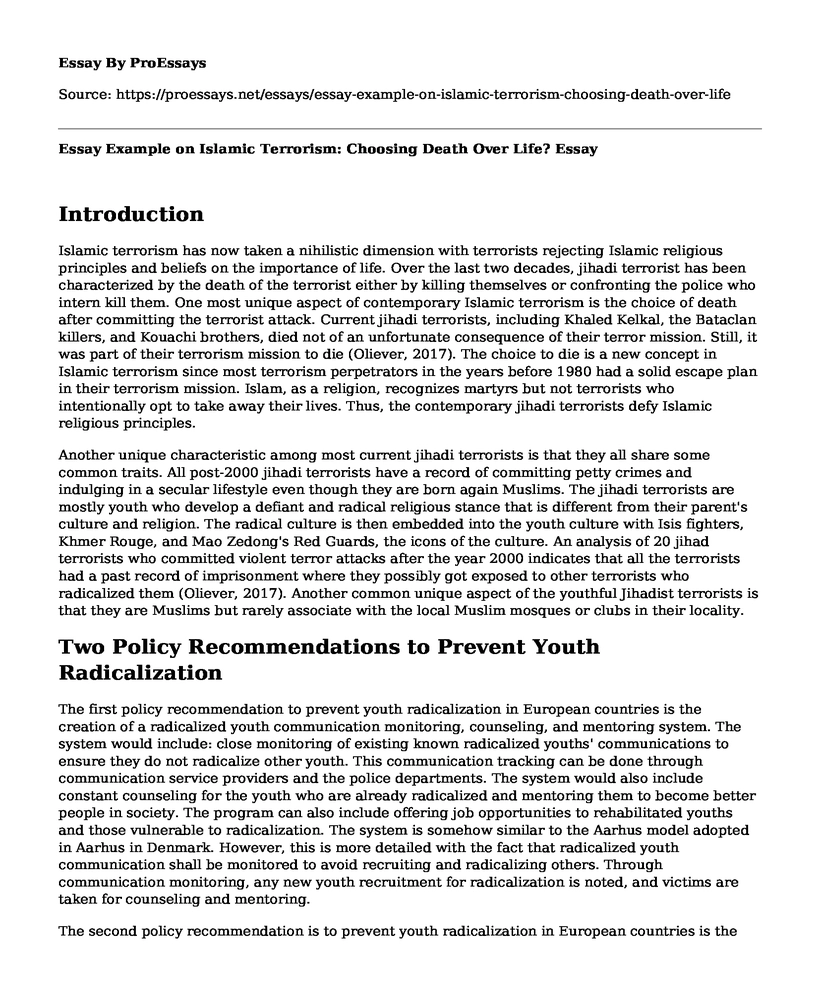Introduction
Islamic terrorism has now taken a nihilistic dimension with terrorists rejecting Islamic religious principles and beliefs on the importance of life. Over the last two decades, jihadi terrorist has been characterized by the death of the terrorist either by killing themselves or confronting the police who intern kill them. One most unique aspect of contemporary Islamic terrorism is the choice of death after committing the terrorist attack. Current jihadi terrorists, including Khaled Kelkal, the Bataclan killers, and Kouachi brothers, died not of an unfortunate consequence of their terror mission. Still, it was part of their terrorism mission to die (Oliever, 2017). The choice to die is a new concept in Islamic terrorism since most terrorism perpetrators in the years before 1980 had a solid escape plan in their terrorism mission. Islam, as a religion, recognizes martyrs but not terrorists who intentionally opt to take away their lives. Thus, the contemporary jihadi terrorists defy Islamic religious principles.
Another unique characteristic among most current jihadi terrorists is that they all share some common traits. All post-2000 jihadi terrorists have a record of committing petty crimes and indulging in a secular lifestyle even though they are born again Muslims. The jihadi terrorists are mostly youth who develop a defiant and radical religious stance that is different from their parent's culture and religion. The radical culture is then embedded into the youth culture with Isis fighters, Khmer Rouge, and Mao Zedong's Red Guards, the icons of the culture. An analysis of 20 jihad terrorists who committed violent terror attacks after the year 2000 indicates that all the terrorists had a past record of imprisonment where they possibly got exposed to other terrorists who radicalized them (Oliever, 2017). Another common unique aspect of the youthful Jihadist terrorists is that they are Muslims but rarely associate with the local Muslim mosques or clubs in their locality.
Two Policy Recommendations to Prevent Youth Radicalization
The first policy recommendation to prevent youth radicalization in European countries is the creation of a radicalized youth communication monitoring, counseling, and mentoring system. The system would include: close monitoring of existing known radicalized youths' communications to ensure they do not radicalize other youth. This communication tracking can be done through communication service providers and the police departments. The system would also include constant counseling for the youth who are already radicalized and mentoring them to become better people in society. The program can also include offering job opportunities to rehabilitated youths and those vulnerable to radicalization. The system is somehow similar to the Aarhus model adopted in Aarhus in Denmark. However, this is more detailed with the fact that radicalized youth communication shall be monitored to avoid recruiting and radicalizing others. Through communication monitoring, any new youth recruitment for radicalization is noted, and victims are taken for counseling and mentoring.
The second policy recommendation is to prevent youth radicalization in European countries is the use of Islamic religious rehabilitation initiatives. The initiative includes the contact tracing of all radicalized youths and those vulnerable to radicalization who also have an Islamic religious affiliation. The radicalized or those vulnerable to radicalization are then attached to Islamic leaders who assist them in understanding the principles of Islam in detail and why Islam as a religion values life. There are some countries like Belgium where the number of Muslim youth is very high. Radicalism in youth spreads like a culture that is different from the real expected Islamic culture hence youth should be closely guided into the correct Islamic principles to avoid the use of Islam religion as a means to radicalization.
Reference
Oliever, R. (2017). Who are the new jihadis? The guardian.com. https://www.theguardian.com/news/2017/apr/13/who-are-the-new-jihadis
Cite this page
Essay Example on Islamic Terrorism: Choosing Death Over Life?. (2023, Aug 16). Retrieved from https://proessays.net/essays/essay-example-on-islamic-terrorism-choosing-death-over-life
If you are the original author of this essay and no longer wish to have it published on the ProEssays website, please click below to request its removal:
- Violence Against Women
- Poverty in Education Essay Example
- Gender Wage Gap and Other Labor Market Difference Between Men and Women Paper Example
- LGBT Community: Conquering Discrimination and Stigma in Society - Essay Sample
- Essay Sample on Gender Inequality in Louisiana: The Impact on Women's Health
- Essay Example on LGBT Rights & Equality: Booker Muhlayasia Case
- Sexual Harassment Still Prevalent in Workplaces: End Discrimination Now - Essay Sample







